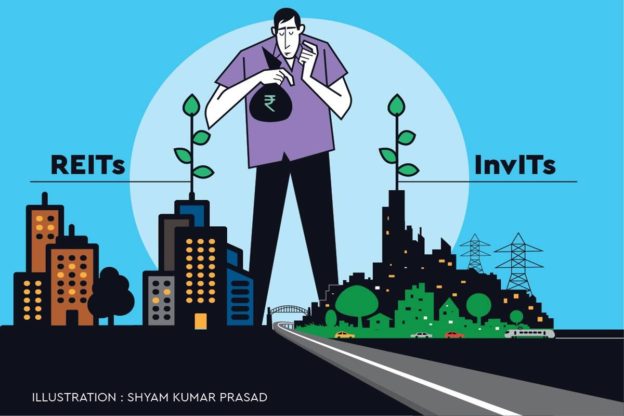By choosing REITs and InvITs, investors can participate in growing sectors like real estate and infrastructure without worrying about maintenance, title, stamp duty, and other expenses
The REITs are required to distribute 90% of their cash flow to shareholders and investors. REITs can also be placed into two categories—publicly traded and non-traded.
The Real Estate Investment Trusts (REITs) and Infrastructure Investment Trusts (InvlTs) collect a large pool of funds from investors and invest the same in the realty/infrastructure projects to generate income. So, their functioning is almost similar to mutual funds in India.
How REITs & InvlTs work
REITs own and operate completed or under-construction properties which have the potential to generate income. The properties can be residential or commercial such as apartments, warehouses, offices, etc. Investors get regular income as well as long-term capital appreciation. The Securities and Exchange Board of India (Sebi) mandates REITs to invest at least 80% of their assets in completed and income-generating properties. The REITs are required to distribute 90% of their cash flow to shareholders and investors. REITs can also be placed into two categories—publicly traded and non-traded.
The InvITs, on the other hand, own and operate huge infrastructure assets like bridges, highways, roads, pipelines, power plants, etc. and 80% of their assets are compulsorily invested in completed and revenue-generating projects. The InvITs also need to distribute 90% of their income to their investors/unitholders.
Benefits of REITs and InvlTs
By choosing REITs and InvITs, investors can participate in growing sectors like real estate and infrastructure without worrying about maintenance, title, stamp duty, and other expenses. These are new-age investment instruments helping investors to diversify their portfolios. These can generate a source of regular income through dividends and have the potential to provide attractive capital appreciation. Their ticket sizes are small, and the liquidity is much higher than a direct investment in the realty market or infrastructure project. Plus, Sebi regulates REITs and InvITs; therefore, the chances of fraud are lesser. As 80% of the corpus is invested in income-generating and completed projects, it also lowers the investment risk.
Risks of investing in REITs/ InvlTs
Listed REITs and InvITs are market-linked instruments, so they can be highly volatile at times. As 90% of the income generated by the REITs is returned to the investors, reinvestments are lower which could weaken the prospects of capital appreciation. Moreover, an investment in the InvlTs involves greater risk as expected returns are based on predictions. The underlying projects also involve political or regulatory risks, and changes in the regulations may result in hurdles for the project. Many also prefer investments in REITs over InvlTs as the former are more liquid because of lower unit price, and investors are usually more familiar with the real estate sector compared to infrastructure.
The 2021-22 Union Budget has made investing in REITs and InvITs easier. Sebi has also reduced the minimum application value. Earlier minimum application size for REITs and InvITs was Rs 50,000 and Rs 1 lakh, respectively. Now, it has been reduced to Rs 10,000- Rs 15,000, bringing them at par with equity IPO applications. Also, the reduced lot size has made them easily tradable on stock exchanges.
The returns on REITs when the investment period is less than one year are considered short-term capital gains (STCG) and more than one year period are considered as long-term capital gains (LTCG). The STCG is taxed at 15%, whereas LTCG over and above Rs 1 lakh is taxed at a 10% rate.
Apart from direct investments in REITs through the stock market, you can also invest in them through mutual fund schemes. If you think you have the required risk appetite and investing in REITs/InvITs can help you achieve your financial goals, they can offer you a good option to diversify your portfolio. However, you should not hesitate to speak to your financial consultant about investing in this innovative asset class. You should also choose AAA-rated REITs and InvlTs and carefully evaluate the sponsor’s corporate profile and market standing before finalising your investment decision.
https://www.financialexpress.com/money/smart-investments-diversify-your-portfolio-with-reits-invits/2318495/







